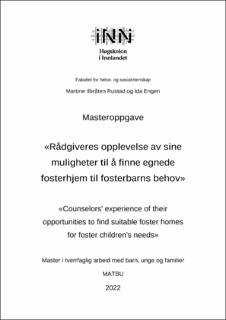Rådgiveres opplevelse av sine muligheter til å finne egnede fosterhjem til fosterbarns behov
Master thesis
Permanent lenke
https://hdl.handle.net/11250/3032951Utgivelsesdato
2022Metadata
Vis full innførselSamlinger
Sammendrag
Denne masteroppgaven handler om hvordan det oppleves å arbeide i en fosterhjemsomsorg med flere fosterbarn enn det er tilgang på fosterhjem. Følgende problemstillingen har blitt undersøkt:«Hvordan opplever rådgivere i fosterhjemstjenesten muligheten av å finne egnede fosterhjem til fosterbarns behov?».Vi brukte en kvalitativ metode for å forske på problemstillingen gjennom individuelle intervjuer. Oppgaven har en fenomenologisk vinkling, der datamaterialet ble analysert med Braun og Clarke (2006) sin tematiske analysemodell. I oppgavens analyse fant vi at temaene «mangel på tilgang på fosterhjem», «ulike forståelser av fosterbarns behov», og «samarbeidets utfordring», oppsummerer rådgivernes opplevelser av eget arbeid. Vi drøftet empirien opp mot de tre teoretiske perspektiver, som var «barnets beste», «matching», «et profesjonsbyråkrati», og «wicked problems». Konklusjonen er at matchingarbeidet er et svært komplekst arbeid å stå i, med mange faktorer og utfordringer som spiller inn og påvirker beslutningsprosessen. This master's thesis is about counselors experience of their work in foster care with more foster children than there is access to foster homes.The issue has been investigated:“How do counselors’ in the foster home service experience the possibility of finding suitable foster homes for foster children's needs?".We used a qualitative method to research the issue through individual interviews. The assignment has a phenomenological angle, where the data was analyzed using Braun and Clarke's (2006) thematic analysis model. In the thesis' analysis, we found that the themes "lack of access to foster homes", "different understandings of foster children's needs" and "the challenge of collaboration" summarize the counselors' experiences of their own work. We discuss the empirical evidence against the three theoretical perspectives, which were "best interests of the child", "matching", "a professional bureaucracy" and "wicked problems". The conclusion is that matching is a very complex task to be involved in, with many factors and challenges that come into play and influence the decision-making process.
